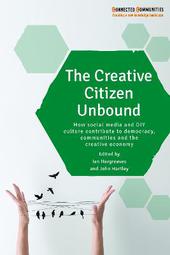
|
The Creative Citizen Unbound: How Social Media and DIY Culture Contribute to Democracy, Communities and the Creative Economy
Paperback / softback
Main Details
| Title |
The Creative Citizen Unbound: How Social Media and DIY Culture Contribute to Democracy, Communities and the Creative Economy
|
| Authors and Contributors |
Edited by Ian Hargreaves
|
|
Edited by John Hartley
|
| Series | Connected Communities |
|---|
| Physical Properties |
| Format:Paperback / softback | | Pages:352 | | Dimensions(mm): Height 234,Width 156 |
|
| ISBN/Barcode |
9781447324959
|
| Classifications | Dewey:302.231 |
|---|
| Audience | | Undergraduate | | Postgraduate, Research & Scholarly | | Professional & Vocational | |
|---|
| Illustrations |
42 Illustrations, black and white
|
|
Publishing Details |
| Publisher |
Policy Press
|
| Imprint |
Policy Press
|
| Publication Date |
6 April 2016 |
| Publication Country |
United Kingdom
|
Description
The creative citizen unbound introduces the concept of 'creative citizenship' to explore the potential of civically-minded creative individuals in the era of social media and in the context of an expanding creative economy. Contributors examine the value and nature of creative citizenship, not only in terms of its contribution to civic life and to social capital but also to various and more contested definitions of value, both economic and cultural.
Author Biography
Ian Hargreaves is Professor of Digital Economy at Cardiff University and Principal Investigator for the AHRC/EPSRC-funded project Media, Community and the Creative Citizen. He was previously a journalist, spending 15 years on the Financial Times, where he became Deputy Editor; followed by Editorships of the Independent and New Statesman. In the late 1980s, he was Director, BBC News and Current Affairs. In 2009 he conducted a review of creative industries policy for the Welsh Government and in 2011, a review of intellectual property issues for the UK coalition Government. He was awarded a CBE in 2012 for services to the creative economy and higher education. John Hartley is John Curtin Distinguished Professor at Curtin University, Western Australia, where he is Director of the Centre for Culture and Technology. He is also Professor of Journalism, Media and Cultural Studies at Cardiff University, Wales. Author of many books and articles in media, cultural, communication and journalism studies, he pioneered research into the creative economy at the ARC Centre of Excellence for Creative Industries and Innovation (2005-12) as ARC Federation Fellow at Queensland University of Technology. He is an elected Fellow of the International Communication Association and Australian Academy of the Humanities. He was awarded the Order of Australia (AM) in 2009.
Reviews"Packed with evidence, this readable book shows that while dismay grows around issues such as online surveillance, creative citizens can still connect digital media and community engagement to fantastic effect." David Gauntlett, University of Westminster and author of Making is Connecting "Offers a practical course of action for collaborative research with communities." LSE Review of Books "This fantastically diverse, rich and colourful book provides critical reflection on the notion of the `creative economy' whilst tracking emergent forms of citizenship associated with new social media. " Nick Gallent, University College London "An ambitious rethink of core concepts of communication and media studies and a close analysis of how digital networks and sharing cultures can add value and generate social and industrial benefit in a creative economy" Terry Flew, Queensland University of Technology, Australia "An outstanding illustration of how researchers and citizens can produce knowledge together for and of this emerging field of creative citizenship." Engin Isin, The Open University "A timely and exciting contribution at the intersections of media, cities, and subversity creativity. Insights on alternative civic cuture in the UK and on the opportunities and challenges collaborative work presents for conceptualising and practicing citizenship in the 21st century." Myria Georgiou, LSE
|